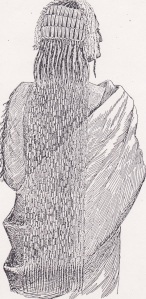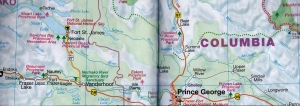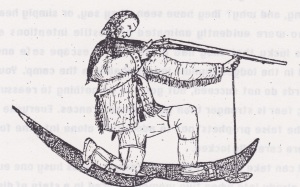Excerpt from Au Pays de l’Ours Noir,
Dispatches of a Missionary 1897, by Father
Adrien Gabriel Morice
***
 ***
***
Translated by Neil Wylie and Garry Girvan
Duck Hunt at Stoney Creek
We look at our canoe: twenty feet long by two feet wide. Like all the traveling canoes in use today, it is made of cottonwood (populus balsamifera) and ii will probably be sufficient to face the rapids of the Noutchakoh (Nechako) and the rocks with which the bed of the Stuart river is strewn in certain places.
About eighty years ago*, all the Carrier canoes were made of birch bark (Betula papyracea). But then a group of Iroquois, those fearless voyageurs of North America, were rash enough to venture as far as Takla Lake paddling two solid wooden canoes. These canoes excited the curiosity, then the envy of a band of Carriers who massacred the Iroquois, took their craft and paddled them to Stuart Lake where they served as model for the first canoes of wood that the Carrirers made.
We trusted ourselves then to the canoe which belonged to Yoekaih (light of day) and left.
We are hardly underway when clouds of water birds, ducks of all sorts, but above all grebes or water-hens, fly up at our approach and hurl themselves upwards, towards a point far away at the end of the lake.
We count no less than twenty species of ducks among the feathered visitors of our district, from the mallard of France (Anas boschas) to the little Lead-eater. Each one of these species has numerous individuals to represent it, but their number cannot be compared to that of the grebes, called water-hens here. Of these we have three species, of which the most important is the Western Grebe (Aechmophorous occidentalis). You need to have lived in our latitudes to have an idea of the life, the animation of our lakes and rivers and of the clatter which is produced here in the springtime. For half a month at least, nothing but gun shots on every side, and generally the shots are not wasted.
I am speaking here of the duck hunt. As for the grebes, our Natives get the mastery of them by a method more economical and no less interesting. They know that these birds of the water rarely follow their route north before the lake is free of ice. So the grebes have to stay in the ice-free part, near the outflow of the river like prisoners. Since they are there in considerable numbers, our men stretch simple fishing nets in lines forming a horse shoe on the water. Then paddling eight or ten canoes at once, and making as much noise as possible, they cut off a part of the flock and drive them into the nets. It is a very amusing exercise and full of action. Even more, it is rich in results; for a catch of a hundred heads is not estimated as anything very wonderful.
In other localities, as for example at Nulki Lake near Stoney Creek, the Natives surprise the grebe on the beach and knock them down with blows of a club before they can regain the water which they have unwisely left for a moment. In fact, though grebes have a very rapid flight once they are in the air, they can only take off if they are in the water.
When the grebes have been plucked, the Aboriginals extract the fat and make cakes out of it. They will draw on this supply later on to season the wild fruits or berries which they have dried in the sun. As for the grebes themselves, what cannot be consumed at once is opened, sliced and smoked to be served in case of scarcity.
About five miles from the lake we come upon the first rapids. It is very short and yet my boatmen insist that I go on foot to the eddy below. There, after emptying the water which has got into the canoe, they take me on board again, and we are on our way.
What more to say? Except to mention that there is still feathered game. The river, a fine steam of 250 metres average width, is literally covered with them. Most often grebes and ducks fly up at our approach; but as their instinct takes them towards the north, they return quickly and pass in bands over our heads. A good chance to knock some down in flight. Yoekaih and Allul, his companion, seize the chance and add to our supply.
The example is contagious. In spite of my resolutions, I could not stop myself from seizing my fowling piece. Bang! it has gone off: not at the ducks, but in the canoe! I have just put a charge through the blankets which serve as seat for one of my men! Two inches higher and he would have had it!
Decidedly it is better to leave things to my boatmen. So I put my weapon in quarantine to punish it for having gone off without my permission.
* (Early in the nineteenth century)


